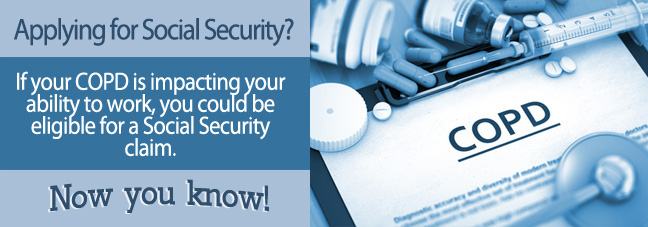Chronic Obstructive Pulmonary Disease (COPD) is a lung disease characterized by blockages in the lungs, which makes breathing - and holding a job - difficult.
For this reason, a COPD diagnosis can qualify you for Social Security Disability benefits. If you are over 50, the Social Security Administration’s (SSA’s) disability grid rules increase your chances of a successful claim.
Yes, it is possible in the event that your COPD is serious enough. You'll either qualify for SSDI or SSI. COPD is an illness, which means the SSA has laid out the criteria for it to be naturally considered a disability.
Is COPD a Disability?
The answer to the question, “Is COPD a disability” depends on one important factor: The seriousness of the symptoms. If you missed or expect to miss at least 12 consecutive months of work, you have cleared the first hurdle in defining your COPD as a disability.
However, missing 12 consecutive months is just the first hurdle to clear when answering the question, “Is COPD a disability.”
According to the Social Security Administration (SSA), you must have earned 20 work credits for your COPD to qualify as a disability.
The SSA calculates the number of work credits for applicants by factoring in age and the number of years in the workforce. In addition to accumulating 20 work credits, you must also clear the biggest hurdle of all.
A team of medical examiners at the SSA refers to a medical guide called the Blue Book to determine whether your COPD symptoms make you eligible for disability benefits.
COPD lists in Section 3.02 of the Blue Book. To have your COPD qualify as a disability, you must suffer from one or more debilitating symptoms.
Not all COPD disability claims receive approval from the SSA. In fact, the SSA denies a majority of disability claims across the board.
If your COPD disability claim comes back denied by the SSA, you should consider undergoing a Residual Functional Capacity (RFC) assessment.
An RFC assessment measures your ability to complete basic job functions. For example, you might have to complete one or more stamina tests to determine how restricted the airflow is from your lungs.
Can You Use Grid Rules With Chronic Obstructive Pulmonary Disease?
The grid rules have a simple premise: the understanding that as you get older, you will experience more difficulty finding a job. The SSA recognizes that employers are not as inclined to hire someone 50 or older for an entry-level position, and that a successful transition to a new workplace is more difficult than for a younger worker.
These employment realities are codified by the grid rules, allowing a disability finding even if you can do a certain amount of work. When using the grid to evaluate your claim, the SSA takes the following into account:
- Your education
- The skill level required at your previous job
- Whether those skills are transferrable to a new job
- Your residual functional capacity for physical work

What Type of Work Can Someone Do With This Condition?
If you have COPD, breathing difficulties will likely prevent you from doing sustained physical work. Using the SSA grid rules, a 54-year-old construction worker who did not graduate from high school will be unable to do work that involves heavy lifting and constant movement due to shortness of breath and constant coughing.
Because they are over 50, transition to a sedentary job will not be easy, so they are more likely to be approved for SSD benefits than a college graduate whose employment history included sedentary jobs such as data entry and compiling reports.
Even if a grid evaluation does not find you disabled, you’ll have a higher chance of ultimately qualifying for benefits if you’re over 50.
The older you are, the expectation that you can be retrained for sedentary work will decrease, and even non-exertional problems that can limit your prospects, such as allergies or depression, are given greater weight.
You'll want to include as many disabling conditions as possible when applying for Social Security benefits.
How Do You Meet a Blue Book Listing?
You may also qualify for disability benefits by meeting a listing in the Blue Book, which is the SSA catalog of disabling impairments. COPD is evaluated under Listing 3.02- Chronic Pulmonary Insufficiency.
You will generally meet the listing if a pulmonary function test shows that your FEV1, which is the amount of air you exhale in a single second, is equal to or less than a certain amount determined by your height.
For example, if you are over six feet tall and your FEV1 is 1.65 liters or less, you will meet the listing. If you are less than five feet tall and your FEV1 is 1.05 or less, you will also be found disabled.
Meeting the Blue Book's eligibility criteria is a great way to qualify, even if you're over age 50. Here's a little more information on how to qualify with COPD.
If you have COPD and you want to apply for SSDI, speak with a Social Security attorney or advocate. The application process can be complicated, and support from a trained and qualified professional will improve your chances of a successful application, thereby giving you the best chance of getting the benefits that you need.
What Stage of COPD Qualifies for Disability?
Chronic Obstructive Pulmonary Disease (COPD) is a common and oftentimes progressive disease. This means that, even when it’s treated, COPD symptoms can still become so severe that the individual suffering from this disease finds themselves in a position in which they are unable to continue working—either the same job and/or type of work they had been doing up to this point, or any job that requires sufficient work.
As such, once their COPD sufferer’s symptoms have reached a certain stage, they may be able to obtain disability benefits from the Social Security Administration (SSA).
There are 4 stages of COPD:
- Stage 1: early
- Stage 2: moderate
- Stage 3: Severe
- Stage 4: Very Severe
Usually, if your COPD is only at stage 1 or 2, you are likely still able to continue working, despite the fact that you are experiencing symptoms. However, once COPD has reached stage 3 or 4, it is typically so severe that people find that they are too “short of breath” to be able to continue the physical activity required at work.
Stage 3 or 4 COPD is recognized as a disability by the SSA in their own Blue Book listing, section 3.02, which is for chronic respiratory disorders.
To be able to obtain disability benefits from the SSA, you must have proof that your COPD has reached stage 3 or 4. You can do this by matching the symptoms described in the Blue Book. Additionally, medical evidence that reveals how your COPD has developed and deteriorated (i.e., gotten worse), as well as any treatment, doctor’s assessment and results of medical tests and scans must be provided.
Finally, it is a necessary requirement that you provide the SSA with proof that your COPD has deteriorated so much that you are no longer able to work for at least 12 months.
What Are The Breathing Tests for Social Security Disability?
In order for the SSA to see that your COPD is so severe that you can no longer work because of it, there are a couple of breathing tests that you can take to show the severity of your COPD, those include:
In order to qualify for SSD benefits, you must meet one of the following requirements:
COPD, due to any cause, with a forced expiratory volume one (FEV1) that is equal to or lower to the minimum for your height, between 1.05 for those who are five feet and 1.65 or those who are six feet.
Chronic impairment of gas exchange due to documented COPD, with a gas diffusion capacity (DLCO) of a single breath under 10.5 mil/min/mm Hg or a low amount of oxygen dissolved in the blood either during rest or exercise, as determined a low partial pressure of oxygen (PO2) and high partial pressure of carbon dioxide (PCO2).
You should consult with your doctor to see what breathing tests would be most beneficial to show how severe your COPD is.
Your doctor will be able to know what breathing tests for Social Security will be the most useful to have in your disability application.
Can You Qualify For SSD With COPD When You Don’t Meet The Listing?
You may unable to work because of COPD, but you may not meet the criteria of the listing in the Blue Book. The Blue Book is the medical guide used by the Social Security Administration (SSA).
Even if you cannot meet the listing criteria, you may still be approved for disability benefits using another approach. Many claimants gain approval through a medical vocational allowance.
Using this approach, you will use a residual functional capacity (RFC) form. The RFC is very detailed. Disability Determination Services (DDS) will complete an RFC by reviewing the details of your medical records and other evidence and supporting documentation. The RFC form is very detailed, and if your treating physician fills one out and it can be beneficial to your disability claim.

The RFC will indicate any restrictions and limitations so DDS can get a clear picture of what you can and cannot do. For example, you may not be able to walk more than 500 feet before you feel short of breath and must rest. Or, you may not be able to bend or squat because of your low oxygen intake.
You may not be able to lift more than 5 pounds, or you may not be able to reach above your head.
When they review your claim and they have an RFC in front of them, they can clearly tell what you can and cannot do. That way, they will know if you are disabled and if you should qualify for disability benefits. When your claim reaches the hearing level, the RFC will detail everything for the judge and help him or her make a decision. The judge will most likely believe that your treating physician is more familiar with your health and your abilities.
Be sure to undergo extensive testing that shows the nature of your medical issues, the severity of those conditions, and how they affect you. Your medical disability must have lasted, or be expected to last, at least 12 months or it must be expected to result in your death.
That way it is considered a full and permanent disability. Your attorney will ask your treating physicians to send written statements or fill out forms that detail your medical issues.
How Long Does it Take to Get Disability with COPD?
After the SSA receives your disability claim for COPD, the next question to answer is “How long does it take to get disability with COPD.”
As with most claims, it takes between three and five months for the SSA to issue a decision about your COPD claim. The amount of time it takes to get disability benefits with COPD is largely dependent on how quickly you file a claim after the disease forced you out of work.
You have to gather and organize medical records that prove you suffer from COPD. The results of diagnostic tests and a written statement from your physician should move your claim along in the SSA system.
You also need to submit timekeeping records that demonstrate how much time you have missed work because of COPD.
Using Multiple Medical Problems
If you cannot qualify using your COPD diagnosis alone, you may qualify when all your medical problems are taken into consideration.
As an example, if you cannot qualify with the Blue Book listing of COPD, but you also suffer from hypertension, a heart problem, and diabetes, you should include those medical conditions and the symptoms and restrictions that they cause you.
Having more than one medical problem can increase your chances of having your disability claim approved. The disability examiner will have to take all your medical problems into consideration as well as the restrictions and limitations you have because of them.

While COPD alone may not be considered disabling because it isn’t severe enough, when you add problems with blood pressure and a hear condition, it may be all it takes to show that you are unable to work and earn a living.
The heart problem may limit your ability to walk or exert yourself, and the blood sugar problems may make it difficult for you to stand long periods and may call for frequent breaks for you to check your blood sugar levels, to take medication or snack, or to address your health issues in general.
You want to make sure all your issues are given fair consideration because they can help paint a bigger picture of your overall health restrictions and limitations.
How Long Does it take to Get Disability for COPD?
Unfortunately, there is no black and white answer for long it will take to get disability for COPD, but there are some factors that could help speed up the process.
First things first, if you have COPD and you are applying for Social Security disability benefits, it usually takes between three to five months to hear back from the SSA regarding their decision on your application.
If approved, you will receive your first disability benefits check sixth full months after the date your disability began. If your application for disability benefits is denied, the process for getting disability for COPD can be much longer.
There are some ways to help increase the time it takes to hear back from the SSA regarding your disability claim for COPD, the first thing that can help with that is you should send all your medical documents and records with your initial application.
That could help decrease the time it takes for the disability examiner to come with their decision. Another way you can help speed up the process to get disability for COPD is to list the contact information for all of your doctors, that way the SSA can contact them if they have any further questions.
Having a letter of recommendation from your doctor can go a long way into helping your disability claim get approved.
If you send your doctor’s letter of recommendation, it can help show that your COPD is so severe, that you can no longer work full time because of it.
The last thing that you can get do is to stay on top of your claim’s progress. Once you send in your application, don’t just assume that it is all set then.
The SSA could ask for more documents and if you are monitoring your claim’s progress carefully, it can help speed up the time it takes for the SSA regarding their decision.
How Does A Disability Lawyer Can Help You?
The disability claims process is complex. An attorney will be familiar with all the steps of having a claim approved and will know the best way to proceed with your claim.
Your lawyer will be able to review the details of your claim and determine if you have adequate evidence or if more supporting documentation must be gathered to get your claim on the right track.
Most disability claims are denied on the initial review, and the highest chance of having a claim approved is when you reach the hearing level.
A study by the Government Accountability Office (GAO) shows that disability claimants who were represented by a lawyer were three times more likely to be awarded disability benefits than claimants who did not.
When you should hire a lawyer depends on the specifics surrounding your situation and where you are in the claims process. You will definitely want to be represented by a lawyer when you reach the hearing level.

When go to the hearing, you will be questioned by a judge. An attorney can prepare you for questioning and review all the files to determine if everything is in order for a successful claim.
After all, your lawyer will not be paid until you win your claim and are approved for benefits. At that time, your attorney will receive a portion of your backpay.
To make sure your disability claim for COPD is on the right track, and to improve your odds of having your claim approved, enlist the help of a disability lawyer. When you retain an attorney, you will not have to pay anything out of pocket. Instead, your lawyer will take the case on a contingency basis. That means that your attorney will not be paid until you are approved for disability benefits and recover your backpay.
Complete the Free Case Evaluation Form so someone with a disability lawyer’s office can review the details of your claim and determine how to proceed with your disability claim for COPD.
The monthly benefits could help you with basic living expenses as well as the cost of your medical care.
A lawyer will help you get your claim on the right track more efficiently and will ensure you have all the medical records in order to succeed with your claim.